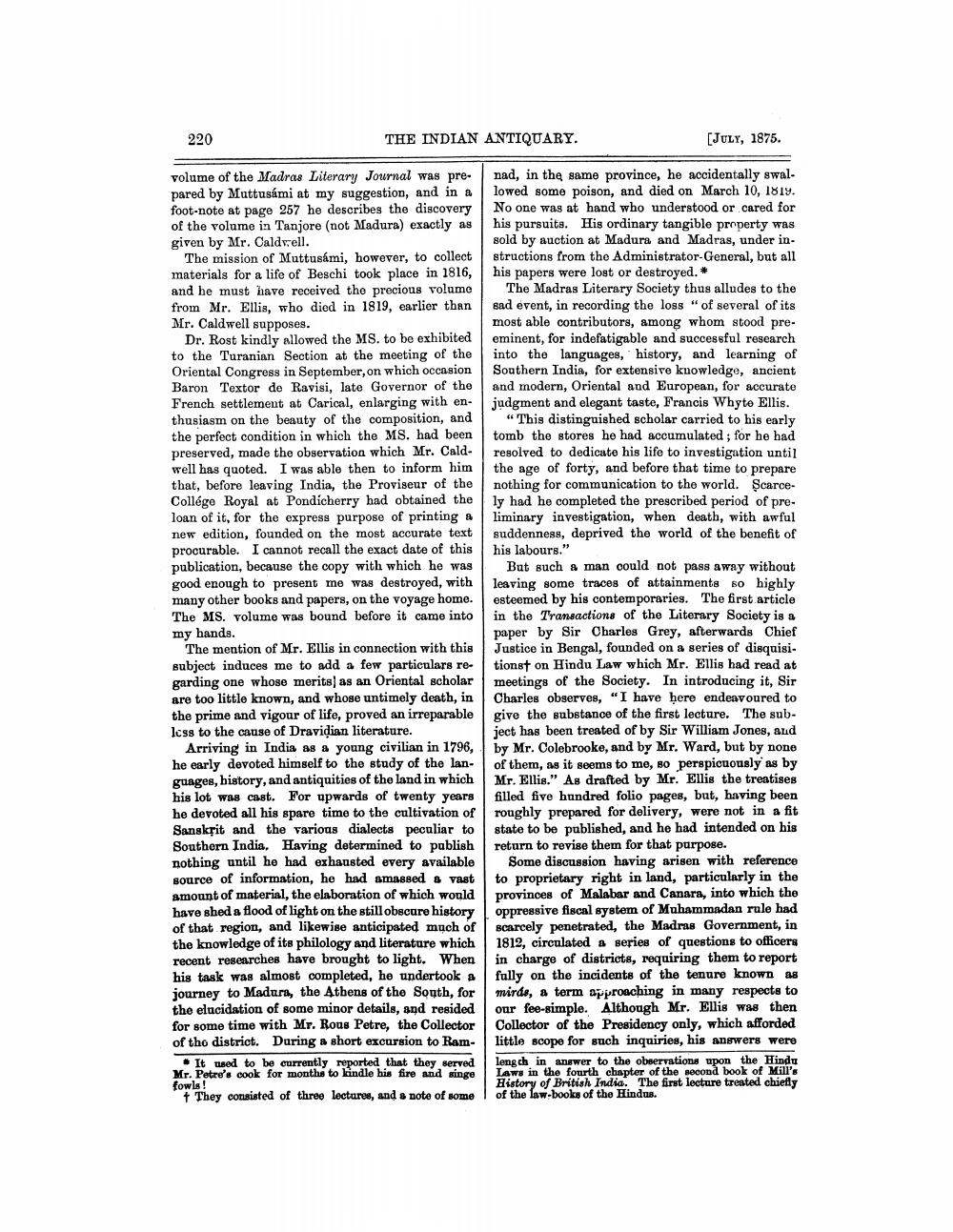________________
220
THE INDIAN ANTIQUARY.
volume of the Madras Literary Journal was prepared by Muttusámi at my suggestion, and in a foot-note at page 257 he describes the discovery of the volume in Tanjore (not Madura) exactly as given by Mr. Caldwell.
The mission of Muttusámi, however, to collect materials for a life of Beschi took place in 1816, and he must have received the precious volume from Mr. Ellis, who died in 1819, earlier than Mr. Caldwell supposes.
Dr. Rost kindly allowed the MS. to be exhibited to the Turanian Section at the meeting of the Oriental Congress in September, on which occasion Baron Textor de Ravisi, late Governor of the French settlement at Carical, enlarging with enthusiasm on the beauty of the composition, and the perfect condition in which the MS. had been preserved, made the observation which Mr. Caldwell has quoted. I was able then to inform him that, before leaving India, the Proviseur of the Collége Royal at Pondicherry had obtained the loan of it, for the express purpose of printing a new edition, founded on the most accurate text procurable. I cannot recall the exact date of this publication, because the copy with which he was good enough to present me was destroyed, with many other books and papers, on the voyage home. The MS. volume was bound before it came into my hands.
The mention of Mr. Ellis in connection with this subject induces me to add a few particulars regarding one whose merits) as an Oriental scholar are too little known, and whose untimely death, in the prime and vigour of life, proved an irreparable less to the cause of Dravidian literature.
Arriving in India as a young civilian in 1796, he early devoted himself to the study of the languages, history, and antiquities of the land in which his lot was cast. For upwards of twenty years he devoted all his spare time to the cultivation of Sanskrit and the various dialects peculiar to Southern India. Having determined to publish nothing until he had exhausted every available source of information, he had amassed a vast amount of material, the elaboration of which would have shed a flood of light on the still obscure history of that region, and likewise anticipated much of the knowledge of its philology and literature which recent researches have brought to light. When his task was almost completed, he undertook a journey to Madura, the Athens of the South, for the elucidation of some minor details, and resided for some time with Mr. Rous Petre, the Collector of the district. During a short excursion to Ram
[JULY, 1875.
nad, in the same province, he accidentally swallowed some poison, and died on March 10, 1819. No one was at hand who understood or cared for his pursuits. His ordinary tangible property was sold by auction at Madura and Madras, under instructions from the Administrator-General, but all his papers were lost or destroyed.*
The Madras Literary Society thus alludes to the sad event, in recording the loss "of several of its most able contributors, among whom stood preeminent, for indefatigable and successful research into the languages, history, and learning of Southern India, for extensive knowledge, ancient and modern, Oriental and European, for accurate judgment and elegant taste, Francis Whyte Ellis.
"This distinguished scholar carried to his early tomb the stores he had accumulated; for he had resolved to dedicate his life to investigation until the age of forty, and before that time to prepare nothing for communication to the world. Scarcely had he completed the prescribed period of preliminary investigation, when death, with awful suddenness, deprived the world of the benefit of his labours."
It used to be currently reported that they served Mr. Petre's cook for months to kindle his fire and singe fowls!
†They consisted of three lectures, and a note of some
But such a man could not pass away without leaving some traces of attainments so highly esteemed by his contemporaries. The first article in the Transactions of the Literary Society is a paper by Sir Charles Grey, afterwards Chief Justice in Bengal, founded on a series of disquisitionst on Hindu Law which Mr. Ellis had read at meetings of the Society. In introducing it, Sir Charles observes, "I have here endeavoured to give the substance of the first lecture. The subject has been treated of by Sir William Jones, and by Mr. Colebrooke, and by Mr. Ward, but by none of them, as it seems to me, so perspicuously as by Mr. Ellis." As drafted by Mr. Ellis the treatises filled five hundred folio pages, but, having been roughly prepared for delivery, were not in a fit state to be published, and he had intended on his return to revise them for that purpose.
Some discussion having arisen with reference to proprietary right in land, particularly in the provinces of Malabar and Canara, into which the oppressive fiscal system of Muhammadan rule had scarcely penetrated, the Madras Government, in 1812, circulated a series of questions to officers in charge of districts, requiring them to report fully on the incidents of the tenure known as mirás, a term approaching in many respects to our fee-simple. Although Mr. Ellis was then Collector of the Presidency only, which afforded little scope for such inquiries, his answers were length in answer to the observations upon the Hindu Laws in the fourth chapter of the second book of Mill's History of British India. The first lecture treated chiefly of the law-books of the Hindus.




